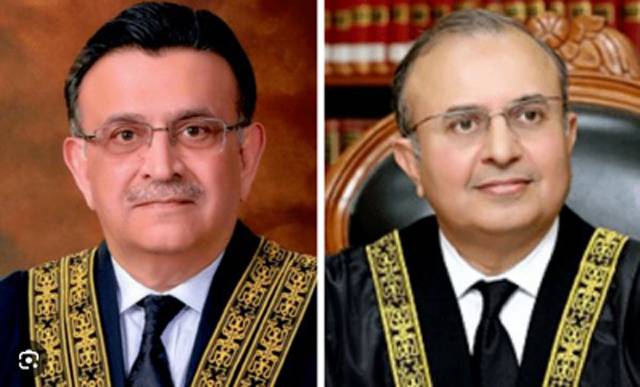ISLAMABAD - Judge of Supreme Court of Pakistan Justice Syed Mansoor Ali Shah Tuesday again urged the Chief Justice of Pakistan to constitute a Full Court for hearing of the petition against NAB amendments.
A three-member bench of the apex court headed by CJP Umar Ata Bandial and comprising Justice Ijaz ul Ahsan and Justice Syed Mansoor Ali Shah conducted hearing of former prime minister Imran Khan’s petition against the amendments in the National Accountability Ordinance (NAO), 1999.
Onset of the hearing, the Chief Justice said that the court has already spent so much time on this case (NAB amendment). He said that Attorney General for Pakistan had conceded the defects in the Supreme Court (Practice and Procedure) Act, 2023 and sought time to review the law. He said that it was the reason that the court had passed a judgment on Supreme Court Review of Judgment and Orders Act, 2023.
Justice Bandial said that the government had created new right of appeal, while the Constitution is clear that there cannot be second appeal against the judgment of the apex court. He stated that on June 1 & 8, 2023 the AGP had sought time to get instructions from the government. The National Assembly did not make amendment in the Practice and Procedure Act, and the government of the day has still not decided about this law.
Makhdoom Ali Khan, representing the government, argued that a Full Court judgment in Dr Mubashir Hassan states that the order or verdict of the courts can be suspended but not the law. The Full Court through an interim order suspended the NRO, in Dr Mubashar Hassan case, was recalled in the final order.
The Chief Justice said that through this Act, salient feature of the Constitution i.e. independence of th6e judiciary was assailed. First time it was tried to control the powers of Chief Justice, therefore, an eight-member bench stayed the operation of the law.
Kh Haris said that the Act was direct encroachment on the power of the apex court. This was the reason that the 8-member order was necessary. Justice Ijaz observed even the government realized to review the Act as there was defect in it, adding the order is still in the field, and it could be disregarded.
Justice Mansoor questioned in the light of the pendency of the Act’s case should the hearing of the instant matter be continued. He added, “I know there were 46 hearings, but I want to formalize my opinion after hearing the counsels.” Makhdoom said that the law is still in the field and a Full Court be constituted to decide this case.
Justice Mansoor remarked that the petitioner has challenged specific provisions of the amendments made in the NAB law, but now he is changing the petition as more amendment made in NAO. Kh Haris said that he had sought the apex court permission to amend the petition. “I have given the list of each provision that has been challenged, and why I (petitioner) challenged them. The Chief Justice told Kh Haris; “If you would add more facts to the petition then we do not have time.”
Makhdoom Ali Khan contended that the petition is speculative in nature, and the petitioner has not identified the Articles and rules laid down by the Supreme Court which are against the constitution. He submitted that the petitioner has not stated which provisions of law are ex facie unconstitutional. The petitioner is only feeling that the provisions are unfair and unconstitutional.
The Chief Justice said that the ground taken in this case is trusteeship, which is based on the judgments of the apex court. It has been contended by the petitioner that through amendments immunity has been given to a certain class, which violates the principle of trusteeship. In the statement of account, the provision related to credit has been changed, and also the concept of ‘benami’ changed.
“If I am not mistaken the petitioner’s focus is on the elected representatives, and exonerated the civil servants. The civil servants due to the NAB law were hesitant to make policies, adding there was so much mistrust at the policy level,” the CJP said.
Makdoon argued that the court is looking at law which reduces rigour and the statute is made to transfer cases from one forum to another. He further said, “I have not come across any provision of the Constitution which is violated by reducing the sentence, and transfer of cases from one court to another court.” He said that in USA capital punishment in 40 offences were changed to lesser punishment. Later, the bench deferred hearing of the case till today.






